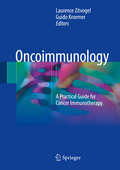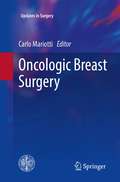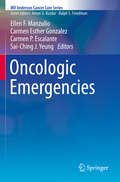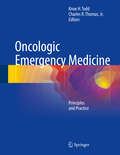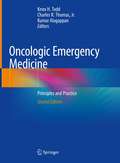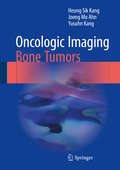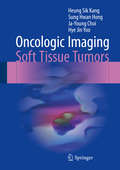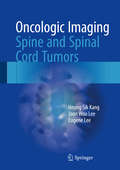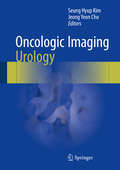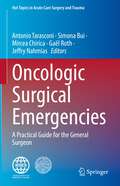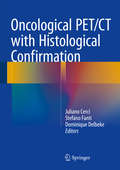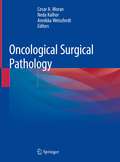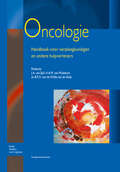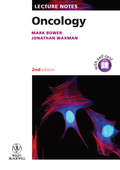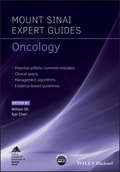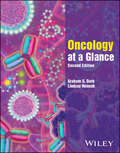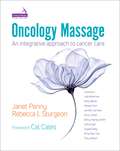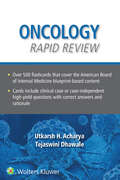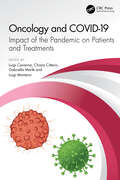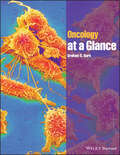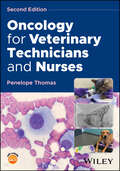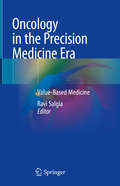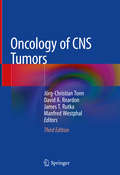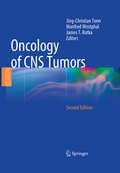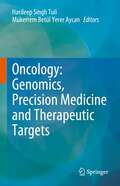- Table View
- List View
Oncoimmunology
by Guido Kroemer Laurence ZitvogelIn this book, leading experts in cancer immunotherapy join forces to provide a comprehensive guide that sets out the main principles of oncoimmunology and examines the latest advances and their implications for clinical practice, focusing in particular on drugs with FDA/EMA approvals and breakthrough status. The aim is to deliver a landmark educational tool that will serve as the definitive reference for MD and PhD students while also meeting the needs of established researchers and healthcare professionals. Immunotherapy-based approaches are now inducing long-lasting clinical responses across multiple histological types of neoplasia, in previously difficult-to-treat metastatic cancers. The future challenges for oncologists are to understand and exploit the cellular and molecular components of complex immune networks, to optimize combinatorial regimens, to avoid immune-related side effects, and to plan immunomonitoring studies for biomarker discovery. The editors hope that this book will guide future and established health professionals toward the effective application of cancer immunology and immunotherapy and contribute significantly to further progress in the field.
Oncologic Breast Surgery
by Carlo MariottiThis book presents the most recent developments in oncologic breast surgery and takes full account of diagnostic, pathologic, and radiologic inputs. It is divided into three parts, the first of which discusses the premises underlying the modern surgical approach to breast cancer. The second part is devoted to what might be termed the conservative program, i. e. , breast conservation and oncoplastic surgery, conservative mastectomy, and sentinel node biopsy and axillary dissection. The final part of the book covers different forms of surgery and other treatments in particular settings. Topics include plastic and reconstructive surgery, DCIS surgery, radio-guided surgery, adjuvant systemic therapy, intraoperative radiotherapy, and the role of surgery in locally advanced and metastatic disease. The detailed descriptions of techniques are accompanied by numerous high-quality illustrations. This book will be of value to both experienced practitioners and surgical trainees.
Oncologic Emergencies
by Ellen F. Manzullo Carmen Esther Gonzalez Carmen P. Escalante Sai-Ching J. YeungThis new resource on managing oncologic emergencies is directed at all health care professionals who care for patients with cancer or survivors. Edited and written by clinician-experts at The University of Texas MD Anderson Cancer Center, the book covers the full range of oncologic emergencies, from cardiac and neurologic to orthopedic to hematologic, and addresses important palliative care, ethical, and Emergency Department considerations. Chapters are structured with busy clinicians in emergent and urgent settings in mind, and each chapter concludes with a series of key practice points and a list of suggested readings for those who wish to delve deeper into a subject. For any clinician facing the increasing number of patients who experience an oncologic emergency, this is an up-to-date, clinically focused, and authoritative resource.
Oncologic Emergency Medicine
by Jr. Knox H. Todd Charles R. ThomasThis is the first comprehensive clinical reference on cancer emergencies. It is edited and written by world-renowned experts in emergency medicine and oncology and covers the diagnosis and management of the full range of emergencies caused directly by cancer or by its treatment. It shows how the entire spectrum of clinical medicine is brought to bear in the care of cancer patients in the unique setting of the emergency department (ED), from health promotion and prevention, to treatment and palliative care. Recognizing the multiple, overlapping contexts in which emergency care of cancer patients occurs, the book addresses clinically crucial interdisciplinary topics such as the ethics of ED cancer care, the interface with palliative social work, substance abuse, and more. Finally, perspective on care system and social forces that shape ED cancer care, such as cancer care disparities and care models, and on how ED cancer care is delivered outside of the United States, frame the book as a whole. Against the backdrop of rising numbers of cancer patients andsurvivors as the United States population ages and a forecast shortage ofoncologists, this book is designed to serve as the authoritative, single-source clinical reference on cancer emergencies. The intended audience includes emergency physicians, oncologists, internists, family physicians, emergency nurses, nurse practitioners, physician assistants, policy makers as well aspre- and postgraduate trainees.
Oncologic Emergency Medicine: Principles and Practice
by Knox H. Todd Charles R. Thomas Kumar AlagappanThe expanded second edition of this key clinical reference provides the most up-to-date and comprehensive review of oncologic emergencies. It covers the diagnosis and management of the full range of emergencies caused directly by cancer and/or treatment, including chemotoxicity, radiotoxicity and post-surgical complications, as well as transplant-related issues and toxicities of novel antineoplastic agents and the new immunotherapies. The book also shows how the entire spectrum of clinical medicine is brought to bear in the care of cancer patients in the unique setting of the emergency department (ED), from health promotion and prevention, to treatment and palliative care. Recognizing the multiple, overlapping contexts in which emergency care of cancer patients occurs, the book addresses clinically crucial interdisciplinary topics such as the ethics of ED cancer care, analgesic misuse and abuse, informatics, quality improvement and more. Finally, perspectives on care system and social forces that shape ED cancer care, such as cancer care disparities and care models, frame the book as a whole. Edited and written by world-renowned experts in emergency medicine and oncology, the Second Edition of Oncologic Emergency Medicine: Principles and Practice is the definitive resource for emergency physicians, oncologists, internists, family physicians, emergency nurses, nurse practitioners, physician assistants, and policy makers as well as pre and postgraduate trainees.
Oncologic Imaging: Bone Tumors
by Heung Sik Kang Joong Mo Ahn Yusuhn KangThis book aims to provide readers with a sound understanding of the spectrum of radiologic appearances of bone tumors, which reflect histopathology, and the pattern analysis of imaging findings. The first part of the book explains basic concepts and diagnostic parameters, including demographics, lesion location, biological activity, matrix mineralization, and endosteal and periosteal reactions. In the second part, typical and atypical radiologic features of bone tumors are reviewed in detail, with emphasis on the characteristic radiographic and MR imaging findings and reference to schematic drawings and pathologic or operative images when appropriate. The third part focuses on problem solving in cases encountered in real radiology practice and identifies categorical patterns on the basis of radiographic and MR variables and lesion location. Informative cases are illustrated and compared to enhance understanding of differential diagnosis using pattern analysis. The final part of the book helps readers to consolidate what they have learned and to hone their diagnostic reasoning skills by presenting about 30 typical bone tumor cases with questions, answers, and commentary.
Oncologic Imaging: Soft Tissue Tumors
by Heung Sik Kang Sung Hwan Hong Ja-Young Choi Hye Jin YooThis book helps readers to overcome the challenges encountered during the imaging diagnosis of soft tissue tumors due to their diversity and the significant overlap in imaging features between different tumors. It does so by fostering familiarization with typical findings and clearly explaining the pattern analysis of soft tissue tumors. The book opens with an overview of diagnostic considerations and discussion of the basic concepts of diagnostic imaging studies and histopathologic examinations. Grading and staging of soft tissue sarcomasare then described. In the second part of the book, radiologic features of soft tissue tumors are reviewed in detail, based on the 2013 WHO classification system. The third part summarizes diagnostic imaging clues, including characteristic imaging findings and radiologic signs that aid in specific diagnosis and differential diagnosis. The book closes by presenting 30 typical cases of soft tissue tumors, with questions, answers, and commentary, in order to help readers to consolidate what they have learned and to hone their diagnostic reasoning skills.
Oncologic Imaging: Spine and Spinal Cord Tumors
by Heung Sik Kang Joon Woo Lee Eugene LeeThis book is a detailed guide to image interpretation in patients with spine and spinal cord tumors that will enable clinicians and residents to improve their diagnostic abilities. The book opens by introducing basic concepts in the imaging of spinal tumors, namely the compartmental approach and the histologic basis for the different imaging appearances. These concepts are explained with the aid of representative cases and schematic illustrations. The second part of the book represents a "training step" in which various spinal tumors are described in detail, focusing on the imaging findings. Representative cases are presented with radiographic, CT, and MR images; in addition, schematic illustrations and pathologic or operative images are included in selected cases. The third part is a "practice step" describing tips for correct imaging diagnosis. Individual chapters in this part focus on incidence-, age-, location-, and imaging pattern-based approaches to bone, extradural, intradural extramedullary, intramedullary, and pediatric spinal tumors. The presented cases will enhance the reader's understanding of the different tumor patterns and assist in solving diagnostic problems that may be encountered in daily practice.
Oncologic Imaging: Urology
by Seung Hyup Kim Jeong Yeon ChoThis book is designed as a reference and working guide for practitioners who deal with patients with neoplastic diseases of the urinary tract and male genitalia, including tumors of the kidney, ureter and urinary bladder, prostate, testis, adrenal gland, and retroperitoneum. Each chapter describes and illustrates key imaging findings relevant to the characterization, differential diagnosis, and staging of lesions. Pattern recognition is facilitated through the use of schematic drawings, and imaging findings on post-treatment follow-up also form an important component of the book. Brief core descriptions of related multidisciplinary fields, such as nuclear medicine, pathology, urologic surgery, and radiation oncology are included whenever relevant.
Oncologic Surgical Emergencies: A Practical Guide for the General Surgeon (Hot Topics in Acute Care Surgery and Trauma)
by Antonio Tarasconi Simona Bui Mircea Chirica Gaël Roth Jeffry NahmiasThis book will offer a practical guide for the surgical management of oncologic emergencies, that pose great challenges to both surgeons and oncologists. Combining the knowledge of experienced surgeons and oncologists, it describes the experience gained from daily life into a tertiary hospital. Every chapter will be focused on radical treatment of primary tumors, metastatic disease and palliation, and will include an “Highlight” section with 4-5 key messages at the beginning of each chapter, whereas at the end a flow-diagram will be employed to summarize the subject discussed topic. Every chapter will be written by at least two authors, including a surgeon and an oncologist, to guarantee a 360 degrees analysis of each topic. This work will benefit both surgeons and oncologists: surgeons will found in it a step to step practical tool that helps the decision making process, while oncologists will find interesting indications about how and when to involve a general surgeon into the management of an oncologic emergent condition.
Oncological PET/CT with Histological Confirmation
by Dominique Delbeke Stefano Fanti Juliano CerciThis book reviews the important new field of PET/CT-guided biopsy, which is of potential value in optimizing the diagnostic yield of biopsies. The role of this technology is examined in a range of malignancies, including lymphoma, pancreatic, breast cancer and CNS malignancies. True positive and false positive cases are presented and discussed, and many aspects of PET and pathology are addressed. The book describes many case presentations illustrated with mostly 18F-FDG PET/CT images, but also other PET radiopharmaceuticals such as 18F-FLT. The three editors are expert nuclear medicine physicians from Europe and North and South America, and the range of experiences gained in using PET/CT across the globe is reflected in the book.
Oncological Surgical Pathology
by Annikka Weissferdt Cesar A. Moran Neda KalhorThis text provides the necessary tools and up-to-date information on the morphological approach and most current use of ancillary techniques in the diagnosis and treatment of malignant tumors. The work is divided by sub specialty areas so that the reader can easily obtain the information desired. Features of histopathological lesions are presented in each area, as well as an up-to-date use of the different immunohistochemical stains and molecular biology features, when applicable, which are commonly used to determine treatment modalities. All sub specialty sections are written by sub specialty pathologists with experience in tumor pathology and who work in a cancer center. Each chapter is richly illustrated and properly referenced. Oncological Surgical Pathology will be of use not only for pathologists (including pathology residents and fellows), but also for oncological surgeons, oncologists and interventional radiologists.
Oncologie: Handboek voor verpleegkundigen en andere hulpverleners
by B.F.H. van Walle-van de Geijn H.A.M. van Muilekom J.A. van SpilEen vooral door oncologieverpleegkundigen en medisch specialisten geschreven handboek over alle gebieden binnen de oncologie waar de verpleegkundige mee te maken kan krijgen.
Oncology
by Jonathan Waxman Mark BowerCancer is one of the most rapidly changing areas of medicine, affecting ever-increasing numbers of people, and this new edition of Lecture Notes: Oncology brings together all the information a medical student or graduate clinician needs in one accessible volume. It covers the scientific basis and social impact of cancer, describes the origins and presentations of cancer on a regional and system basis, and discusses the fundamentals of oncology treatment and patient management. Including a new section on epigenetics, clinical vignettes, clear illustrations, tables and diagrams, as well as a self-test section of MCQs, Lecture Notes: Oncology provides core knowledge for professionals involved in cancer care.
Oncology (Mount Sinai Expert Guides)
by William K. Oh Ajai ChariThe Mount Sinai Expert Guides provide quick access to point-of-care specialist clinical information for physicians across a range of therapeutic areas. For each specialty area, the guides emphasize: • Common pitfalls in diagnosis and management • How to prevent complications • Diagnostic and treatment algorithms • Key scientific trials • Evidence-based clinical content • Major society guidelines in order to summarize the very latest in diagnosis and management of diseases and related symptoms. Edited by renowned specialists from the Icahn School of Medicine at Mount Sinai, key faculty members provide the content for all chapters. To ensure consistency within each book and the series as a whole, chapters follow a unified structure throughout. Bonus features such as online case studies with related questions for self-assessment, key patient advice, and ICD codes are provided via the series companion website. Each guide also has its own mobile app available for purchase, allowing you rapid access to the key features wherever you may be.
Oncology At A Glance (At a Glance)
by Graham G. Dark Lindsay HennahThe market‐leading at a Glance series is popular among healthcare students and newly qualified practitioners for its concise and simple approach and excellent illustrations. Each bite‐sized chapter is covered in a double‐page spread with clear, easy‐to‐follow diagrams supported by succinct explanatory text. Covering a wide range of topics, books in the at a Glance series are ideal as introductory texts for teaching, learning and revision, and are useful throughout university and beyond. Everything you need to know about Oncology… at a Glance! Discover a comprehensive, newly-revised edition of Oncology at a Glance! Oncology at a Glance demystifies the complexities of cancer biology and treatment for medical students and junior healthcare practitioners. With updated content including emerging therapies, multidisciplinary team approaches, and palliative care, Oncology at a Glance, Second Edition bridges gaps in the often-fragmented exposure to oncology during clinical training. Real-world case studies and accompanying exercises deepen comprehension, enhance understanding, and support problem-solving in oncology practice. Ideal for foundational learning or a quick refresher in clinical practice, Oncology at a Glance, Second Edition: Consolidates key information into concise sections on individual cancers and broader oncological principlesCovers foundational cancer biology, investigation, clinical management, and key human issues such as communication and palliative careIncludes multiple-choice questions, self-assessment exercises, and a companion website with interactive self-testing features Developed with feedback from medical students to ensure relevance and clarity, Oncology at a Glance, Second Edition remains a must-have for undergraduate medical students, nursing students, junior doctors, and allied health professionals. All content reviewed by students for students Wiley Health Science books are designed exactly for their intended audience. All of our books are developed in collaboration with students. This means that our books are always published with you, the student, in mind. If you would like to be one of our student reviewers, go to www.reviewnursingbooks.com to find out more. This title is also available as an e-book. For more details, please see www.wiley.com/buy/9781394292691
Oncology Massage: An integrative approach to cancer care
by Janet Penny Rebecca SturgeonIn Oncology Massage - an integrative approach to cancer care the authors have created a textbook which will provide both experienced and inexperienced therapists with a resource to expand their knowledge and understanding of working with people with cancer. Cancer occurrence and survivorship are now so common that every massage therapist will at some time work with clients who have been through cancer treatment. The short and long-term effects of biomedical cancer treatment require massage therapy adaptations to pressure, site, position and duration to provide safe and effective treatments. Informed massage therapists can support the body to promote overall wellness as well as identify the underlying secondary effects of cancer treatment that contribute to physical dysfunction.Oncology Massage: An Integrative Approach to Cancer Care provides massage therapists with essential information for:Treatment planning based on the physiology of cancer and cancer treatmentsCritical, thoughtful treatment decision makingConsideration of the psychosocial effects of cancerEnhancing therapist self-awareness and building a therapeutic relationship.The information is presented in a clear and simple format with plentiful use of illustrations and information boxes which allows it to be used both as a learning tool for those new to the field of oncology massage and as a resource for quick referral when working with new patients.The techniques of massage therapy change very little; it is the knowledge and understanding of their use that distinguishes a massage therapist. Oncology Massage is unusual in that it includes contributions not only from a range of experienced practitioners but also from people with cancer who have received massage during and after cancer treatment. This feedback from clients provides an invaluable addition to the understanding of how massage can be used as a safe and effective part of cancer care.
Oncology Rapid Review Flash Cards
by Utkarsh Acharya Tejaswini M DhawaleFace the oncology board exam with confidence! Oncology Rapid Review, created and edited by Drs. Utkarsh H. Acharya and Tejaswini Dhawale, is a conveniently portable, effective review tool that helps you prepare for this comprehensive and challenging exam. Sturdy, full-color flash cards provide a focused, case-based review anytime, anywhere.
Oncology and COVID 19: Impact of the Pandemic on Patients and Treatments
by Luigi Cavanna Chiara Citterio Gabriella Marfe Luigi MontanoThose affected by cancer or receiving cancer treatment have often been more susceptible to infections due to coexisting chronic diseases, overall poor health status, and systemic immunosuppressive states caused by both cancer and anticancer treatments. This pioneering text is an introduction to the key topics in the relationship between infection, pollution, and cancer and is an invaluable resource for residents and junior faculty in Oncology facing the practical problems arising and for those still in training. *Looks at the lessons to be learned for future Oncology patients from a series of studies. *Presents relevant international experience from Oncology clinicians and researchers. *Brings together input from different countries, systems, and specialties.
Oncology at a Glance
by Graham G. DarkThis brand new title in the market-leading at a Glance series brings together fundamental information on cancer biology and treatment to provide a holistic understanding of oncology. It explores both relevant scientific content and key human issues, including communication and palliative care.Oncology at a Glance:* Provides an accessible overview of the scientific foundation of cancer medicine* Covers the common cancers as well as key information on presentation and approaches to investigation and management* Includes young adult oncology, the multidisciplinary team, clinical trials in oncology, approach to treatment and response assessment, management of nausea, and end-of-life care* Was developed with students for students, to ensure it contains exactly what students need to knowOncology at a Glance is an ideal guide for medical students and foundation-year doctors as well as any other healthcare professionals looking to consolidate their knowledge of oncology.
Oncology for Veterinary Technicians and Nurses
by Penelope ThomasComprehensive, straightforward oncology learning resource with coverage of diagnosis, staging, treatment, support, and common emergencies and cancer types Oncology for Veterinary Technicians and Nurses is a straightforward educational resource that imparts a basic understanding of practical oncology therapy from the technician perspective thorough coverage of diagnosis and staging, radiation therapy and chemotherapy, pain management, GI support, most cancer types, analgesics, antiemetics, appetite stimulants, and antibiotics. This newly revised and updated Second Edition covers the many advances in veterinary medicine and oncology since the original edition was published in 2009. Readers will find detailed information on oncological emergencies, including hematologic, metabolic, urological, and bone emergencies, as well as common cancers in veterinary patients, including lymphoma and mammary carcinoma in both cats and dogs, along with a number of canine-centric cancers. The book includes nearly 400 images and figures to elucidate key concepts. A series of helpful appendices assists readers in the practical application of concepts discussed throughout the book. With content presented in a logical order, Oncology for Veterinary Technicians and Nurses includes information on: Basics of oncology, covering fundamental concepts in the field and causes of cancer in pets, as well as the processes behind diagnosing and staging cancersTreatment of cancer through surgery, radiation therapy, chemotherapy, receptor and small molecule inhibitors, immunotherapy, intralesional therapies, and electrochemotherapySupportive care of patients through comfort, pain management, physical rehabilitation, gastrointestinal and nutritional support, and hematologic supportSupport for pet owners and caregivers, including communicating with the patient’s human family and supporting the nurse’s emotional experience Oncology for Veterinary Technicians and Nurses is an essential reference on the subject for veterinary nurses and technicians seeking the information they need to properly and safely perform cancer treatments, especially those undergoing diploma, certificate, and bachelor’s degrees in Australia, New Zealand, UK, and USA in particular.
Oncology in the Precision Medicine Era: Value-Based Medicine
by Ravi SalgiaThis volume comprehensively reviews oncology in the precision medicine era of personalized care, latest developments in the field, and indications and clinical trials for the treatment of cancer with targeted therapies, immunotherapy, and epigenetic modulators. It thoroughly addresses concerns of various types of cancers including cancers of the head and neck, lung, colon, esophagus, bladder, pancreas, and breast; melanoma; multiple myeloma; hepatocellular carcinoma; renal cell carcinoma; and sarcomas. It is organized and written in a format that is easy to follow for both clinicians and non-clinical scientists interested in personalized medicine. Chapters cover the identification of the clinical problem and summary of recent findings, tumor biology and heterogeneity, genomics, examples of simple and complex cases, biological pathways, future clinical trials, and financial considerations. Oncology in the Precision Medicine Era: Value-Based Medicine will serve as a useful resource for medical oncologists and healthcare providers tailoring medicine to the needs of the individual patient, from prevention and diagnosis to treatment and follow up.
Oncology of CNS Tumors
by David A. Reardon Manfred Westphal Jörg-Christian Tonn James T. RutkaThis book is an easy-to-use reference that provides ready guidance on the diagnosis and treatment of the full range of tumors of the central nervous system in adults and children. The new edition has been completely revised to reflect the continually evolving landscape of neuro-oncology and provide readers with a thorough update that will inform their clinical practice. Since the previous edition, molecular neuropathology has progressed considerably, leading to a new understanding of specific clinical entities with corresponding changes in treatment concepts. Moreover, tumor biology has become better integrated with clinical neuro-oncology in truly translational efforts. These advances receive detailed attention. In addition, the structure of the book has been adapted to align with the revised 2016 version of the WHO Brain Tumor Classification. Once again, the contributors have been carefully selected as leading experts in the field. Oncology of CNS Tumors is already established as a widely used reference, and this new edition will provide optimal value for highly specialized comprehensive neuro-oncology centers as well as practicing clinicians and researchers.
Oncology of CNS Tumors
by Manfred Westphal J. T. Rutka Jörg-Christian TonnThe rapidity with which new diagnostic procedures and treatment modalities are being developed within neuro-oncology means that experts continually have to strive to ensure that their knowledge remains up-to-date. With this in mind, the editors have prepared a new, revised edition of Neuro-oncology of CNS Tumors that takes account of the very significant advances made since publication of the well-received first edition. The clear structure of the first edition has been retained as it ensures that the book will serve as an easy-to-use reference, providing ready guidance on diagnosis and treatment. Each chapter addresses a particular disease, and great efforts have been made to include all findings and other information likely to be relevant in clinical practice. Once again, the contributors have been carefully selected and are leading experts on their subject. This book will prove of great value to both practicing clinicians and researchers in the field of translational neuro-oncology.
Oncology: Genomics, Precision Medicine and Therapeutic Targets
by Hardeep Singh Tuli Mükerrem Betül Yerer AycanThis book describes translational cancer therapeutics and the way forward from clinical and molecular diagnosis to treatment. In addition, genomics alterations, microRNAs, and long non-coding RNAs translate precision medicine for the individualistic therapy of cancer patients. It describes the involvement of various pharmacogenetic factors in pharmacodynamic/pharmacokinetic (PD/PK) modulations of medicines. Indeed, the role of bioinformatics and biostatistics, considering the extensive data analysis serving precision medicine approaches, has also been entertained in the present book. Therefore, intended book demonstrates the successful medical evidence for the use of precision medicine in the treatment of cancer and its future clinical perspectives. It fills the gaps in cancer biology and precision medicine with its up-to-date content and well-designed chapters. It will serve as a valuable resource for science, medical students, and interdisciplinary researchers. It is a very welcome addition for the scientific community, research centers, and university-industry research collaborators to find out a complete capsular package about cancer drug targets, precision, and personalized medicine (including an introduction to cancer cell signaling, genomic alterations, miRNA targeting, pharmacogenetics, biomarkers, and metabolomics in precision medicine, etc.) at a single platform.
